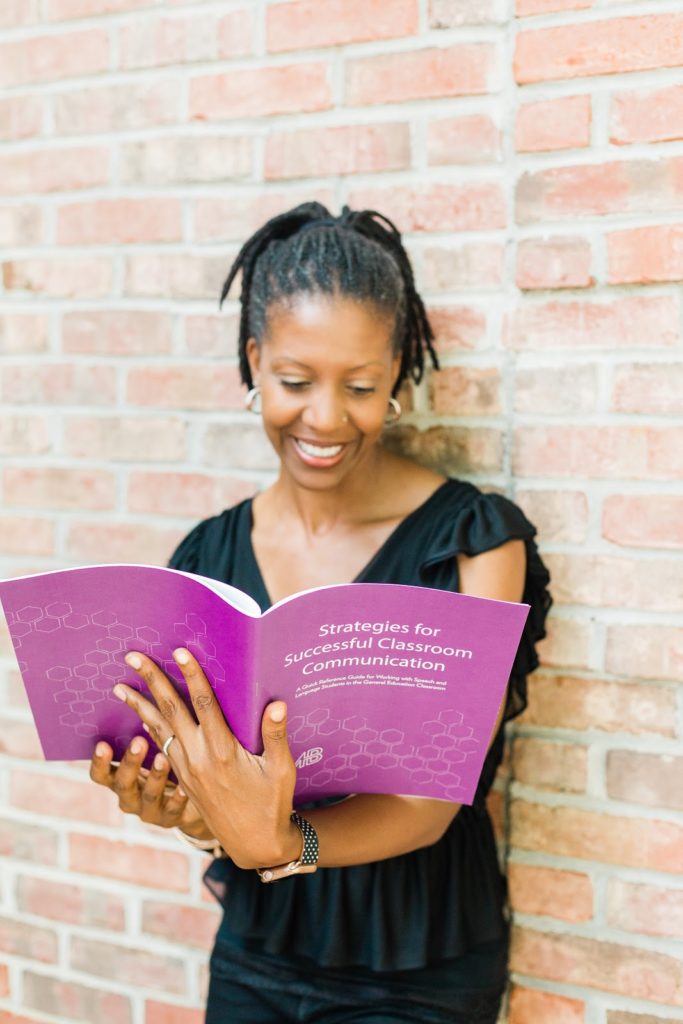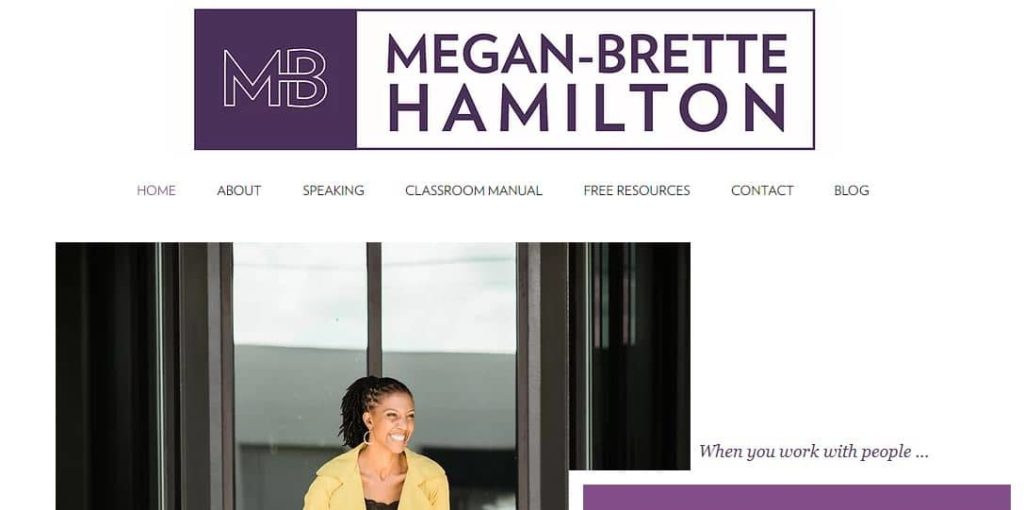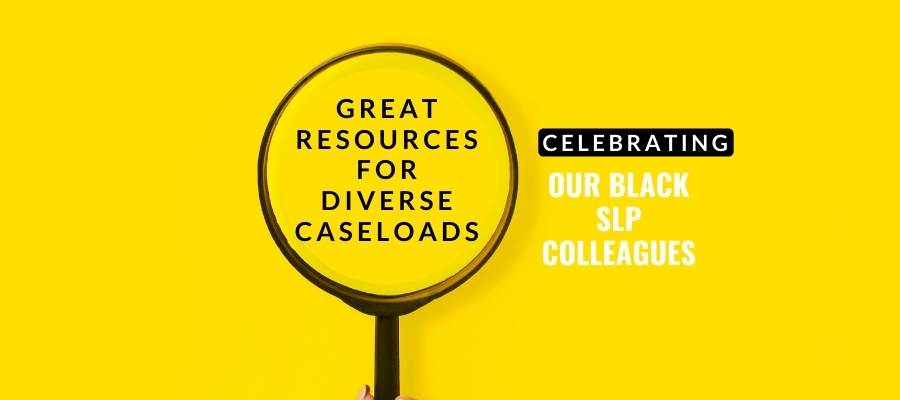Dear SLP,
Where do you get your information to support your Black students?
Who do you turn to with tricky questions about African American English vs Standardized American English, and other dialectal and cultural differences?
How do you navigate staying on top of the breaking research, equality, equity, and difference vs disorder?
How do you support and advocate for your clients who are speakers of AAE?
This post is the first in a series that will highlight a few of the SLPs in our field who are spending their career in research and advocacy for speakers of AAE and the Black community.
As we do with all areas of speech and language, let us look to the experts to guide us on this subject matter.
Below you will find information on the following clinicians:
- WHO they are
- WHAT they do/study
- HOW to tap into their work and continue to learn more from them
WHO: Dionna Latimer-Hearn, Ph.D., CCC-SLP
Dr. Latimer-Hearn is a multilingual speech-language pathologist (SLP) who has held positions in France, Illinois, Japan, Maryland, and Texas.
WHAT she does:
She is a recipient of the AERA Minority Dissertation Fellowship Award and the founder of the Facebook Group: Respect the Dialect. This forum is designed to promote awareness and understanding of the African American English (AAE) dialect, and support educators and SLPs who work with AAE-speaking communities.

Dr. Latimer-Hearn is also the founder and director of REACT Initiative, Inc., an approved ASHA CE Providing organization that advocates for equity in education. For more information about this organization, or to access continuing education courses available, visit their Facebook page.
HOW to learn more:
Dr. Latimer-Hearn currently works as an educational consultant and continuing education provider for public and private organizations in the US and abroad. You can stay in touch, look for upcoming events/presentations, or schedule her for a continuing education course for your organization. For additional resources featuring Dr. Latimer-Hearn see the following:
Feature on the podcast, “You’re Wrong About…”
Feature on the podcast, “The Fresh SLP”: 3 Powerful Ways to Address Systemic Inequalities in Speech Pathology
Article in the ASHA Leader (Jan/Feb 2020) titled “Don’t Get it Twisted—Hear My Voice”
Facebook group supporting the development and promotion of education-related business
WHO: Megan-Brette Hamilton, Ph.D., CCC-SLP

Dr. Hamilton is an assistant professor at Auburn University and an ASHA certified speech-language pathologist.
WHAT she does:
She conducts research focusing on the classroom/educational and clinical experiences of speakers of non mainstream dialects of English, with a particular focus on African American English-speaking children and adults. Her work also focuses on the cultural-linguistic competence of professionals and students working with culturally-linguistically diverse populations.
She is a speaker and author of the Honeybee Connection blog, which celebrates the differences in the ways we speak the same language. She offers workshops and speaking engagements to educate and inspire others in innovative ways.
She is also the author of the ASHA publication: “An Informed Lens on African American English” (Jan-Feb 2020)
HOW to learn more:
Dr. Hamilton presents her work at conferences nationally and internationally, and provides workshops and continuing education courses for continuing maintenance hours. You can look for upcoming events/presentations, OR schedule her for a continuing education course for your organization here:

Listen to her podcast, “Honeybee Connection Podcast by MB”!
Subscribe to The Honeybee Connection blog
Download a free AAE resource
Tune into her free course on MedBridge, “I Don’t See Color: How Your Own Cultural Identity Shapes Your Clinical Practice,” on becoming a culturally competent therapist:
Pick up a copy of her eManual, “Strategies for Successful Classroom Communication,” geared towards SLPs who do push-in services and/or general education classroom teachers. The eManual contains charts and information on language variations that will assist in implementing culturally-linguistically responsive strategies.
Finally, be sure to listen to this collaborative podcast episode with both Megan-Brette and Dionna!
“Language and Identity: Shifting Away from a Deficit Perspective on African American English”
WHO: Brandy Gatlin-Nash, PhD
Dr. Gatlin-Nash is an assistant professor in the School of Education at University of California, Irvine. She is a former K-12 special education teacher.
WHAT she does:
She conducts research that focuses on understanding the needs of children from racially, ethnically, economically, and linguistically diverse backgrounds. The majority of Dr. Gatlin-Nash’s research thus far has explored relations among language variation, namely non-mainstream American English or dialect, and literacy achievement among culturally and linguistically diverse students in early developmental stages of reading. As part of her ongoing research, Dr. Gatlin-Nash investigates nonmainstream dialect use in writing and relations among dialect use in various contexts and literacy outcomes. Her research also explores similarities and differences among bilingual and bidialectal learners in order to determine potential implications for improvement in assessment and instruction among linguistically diverse students.
HOW to learn more:
Contact information and a long list of Dr. Gatlin-Nash’s publications: Brandy Gatlin-Nash, PhD
WHO: Shameka Stanford, PhD, CCC-SLP

Dr. Shameka Stanford is an Associate Professor in the Communication Sciences and Disorders department at Howard University and the Juvenile Forensic Speech-Language Pathologist.
WHAT she does:
Dr. Stanford is the first and only Juvenile Forensic SLP in the United States. Dr. Stanford’s clinical and scholarly work specializes in Juvenile Forensics, Law Enforcement Interaction with youth with CD, and child language disorders. Her research focuses on the confluence and impact of cognitive and communication disorders on the school-to-confinement pipeline, status offenses, involvement with the criminal justice system, law enforcement interaction, and criminal recidivism in youth placed at-risk for delinquency and crime (especially Black and Brown youth from under-resourced areas). Dr. Stanford is also a clinically certified and licensed speech-language pathologist and is licensed to practice in Maryland, Washington, D.C, Florida, and some Caribbean Islands. Through her work, Dr. Stanford has created cutting edge social justice and juvenile justice specialty courses for graduate CSD students, nationally known training programs for law enforcement and legal counsel, and national and international CE workshops and training for licensed SLP clinicians.
HOW to learn more:
Contact information and list of Dr. Stanford’s publications: Shameka Stanford, PhD, CCC-SLP
She shares many valuable resources via Instagram:

SLPs- Our wish for you from this post is that you have been introduced to some leaders in the field who specialize in supporting our Black clients and speakers of AAE. May you continue learning, asking questions, and researching. Lean into the work of SLPs who are doing this important work. Learn from the experts in our field. Celebrate and honor their successes, publications, research findings, and breakthroughs.
Have other SLPs you’d like to see highlighted, celebrated, and whose work needs to be seen? Let everyone know in the comments below.




Hello. Thank you for these highlights and recognitions of our visionary Black Speech-Language Pathologist.